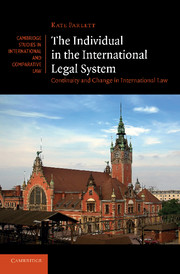Book contents
- Frontmatter
- Contents
- Foreword
- Acknowledgements
- Select list of abbreviations
- Table of cases
- Table of treaties
- Part I The Framework
- Part II The Individual in International Law
- 2 The individual and international claims
- 3 The individual in international humanitarian law
- 4 The individual in international criminal law
- 5 The individual in international human rights law
- Part III Reassessing the Framework
- Bibliography
- Index
- CAMBRIDGE STUDIES IN INTERNATIONAL AND COMPARATIVE LAW
- References
2 - The individual and international claims
Published online by Cambridge University Press: 19 May 2011
- Frontmatter
- Contents
- Foreword
- Acknowledgements
- Select list of abbreviations
- Table of cases
- Table of treaties
- Part I The Framework
- Part II The Individual in International Law
- 2 The individual and international claims
- 3 The individual in international humanitarian law
- 4 The individual in international criminal law
- 5 The individual in international human rights law
- Part III Reassessing the Framework
- Bibliography
- Index
- CAMBRIDGE STUDIES IN INTERNATIONAL AND COMPARATIVE LAW
- References
Summary
Introduction
The doctrine of diplomatic protection has been accepted since the nineteenth century. It provides that an injury to an individual by a foreign state is actionable by that individual's state of nationality. Diplomatic protection, often referred to as a ‘fiction’, transposes wrongs against individuals into wrongs against their state of nationality. But there is also a body of practice in which individuals have been permitted access to international forums to bring a direct claim against a state, without the interposition of their state of nationality. This practice is often referred to as ‘mixed claims’.
Both diplomatic protection and mixed claims practice relate to the protection of individuals, but the two practices engage individuals in the international legal system in fundamentally different ways. This chapter surveys the development of the doctrine and practice of both types of claims over the same three historical periods set out in Part I. In each of these periods, the means and extent to which individuals have been engaged in the international legal system is investigated and assessed against the orthodox accounts of the international legal system examined in Part I. In accordance with the approach taken throughout the book, this chapter is focussed on doctrine, practice and procedure in relation to natural persons, i.e. individuals. Nevertheless, there is occasional reference to claims brought by other entities, including companies.
- Type
- Chapter
- Information
- The Individual in the International Legal SystemContinuity and Change in International Law, pp. 47 - 175Publisher: Cambridge University PressPrint publication year: 2011
References
- 1
- Cited by



